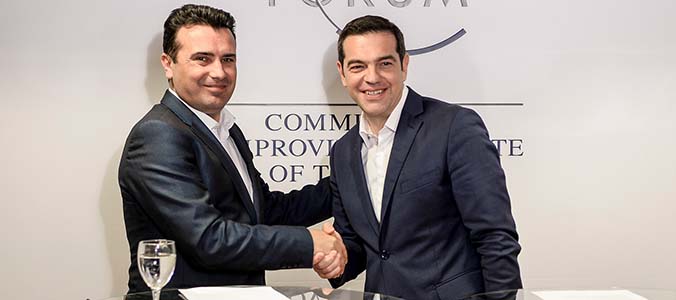
Hessian Peace Prize 2020 goes to Zoran Zaev and Alexis Tsipras
Wiesbaden, December 14 - The Hessian Peace Prize 2020 goes to the Prime Minister of North Macedonia, Zoran Zaev, and the former Prime Minister of Greece, Alexis Tsipras.
Zaev (Social Democratic League, SDSM), Prime Minister of North Macedonia (May 2017 to January 2020 and since the end of August 2020), and Tsipras (Syriza Party), Prime Minister of Greece (January 2015 to July 2019), receive the award for settling the name dispute between the two states. In the future, Macedonia’s name will be “Republic of North Macedonia” (Republika Severna Makedonija).
“With the Hessian Peace Prize, we are honoring two people who have worked for peace and international understanding and who succeeded in resolving a conflict that goes back deep into history,” said Boris Rhein, President of the Landtag, explaining the award.
“The two of them, as head of the Greek government at the time and as prime minister of Macedonia, reached an agreement in the decades-long conflict between their countries, Greece and Macedonia, over the name ‘Macedonia’. In doing so, they achieved a truly diplomatic feat that no one had managed before. Without it, the name dispute that has been going on since Macedonia’s independence in 1991 would have continued to smolder and the feud between the two neighboring countries would have continued to destabilize the entire Balkan region. The nearly thirty-year-old name dispute between the former Yugoslav Republic of Macedonia and Greece was settled peacefully with an agreement on February 12, 2019. A compromise had been found; in the future, the name of the new state created in 1991 will be ‘Republic of North Macedonia’. For the first time, a period of good neighborly relations began and the way was paved for North Macedonia to become an ally in NATO and a partner in the European Union. And this success has an impact far beyond the region. The peace agreement sends a signal to the world. There is not only the law of the strongest. In today’s world, there is still the path of respect and compromise, the path of peace and stability. And by doing so, the laureates have done nothing less than continuing the European path in a great way, without having to give up national identities,” the President of the Landtag stressed.
“Zoran Zaev and Alexis Tsipras have departed from the pattern of insisting on maximum positions and ruling out agreement as defeat or treason. In doing so, they put their political careers at risk and had to negotiate numerous compromises as well as concessions within their parliaments. The agreement is accompanied by the hope of good cooperation and partnership between North Macedonia and Greece. The settlement of the dispute is an example of reconciliation in the region and Europe as a whole,” said Board of Trustees member Professor Dr. Nicole Deitelhoff.
Background
The conflict over the name Macedonia began after the disintegration of Yugoslavia with Macedonia’s declaration of independence in 1991, in which the hitherto Yugoslav constituent republic of Macedonia gave itself the name Republic of Macedonia. Greece immediately objected on the basis of the same name of the region of Macedonia in Greece. The name Macedonia was of Greek origin and designated a historical area with its own culture and history. The Republic of Macedonia countered the Greek argument that the national territory was in the historical region of the Macedonians and that the national feeling existed independently of the name.
![[Translate to English:] Cover "25 Jahre Hessischer Friedenspreis der Albert Oswald Stiftung" [Translate to English:] Cover "25 Jahre Hessischer Friedenspreis der Albert Oswald Stiftung"](/fileadmin/_processed_/0/f/csm_Hess_Friedenspreis_2b95f22576.jpg)
The commemorative publication on the occasion of the 100th birthday of Albert Osswald presents the prize and the prize winners and pays tribute to the founder, who also founded PRIF in 1970. More
PRIF Talk about the Peace Prize
In the PRIF TALK, Karl Starzacher and Bruno Schoch look back at the history of the award and the awardees they remember most.
![[Translate to English:] PRIF Talk #003](/fileadmin/_processed_/5/3/csm_PRIF_Talk_768b4629f2.jpg)